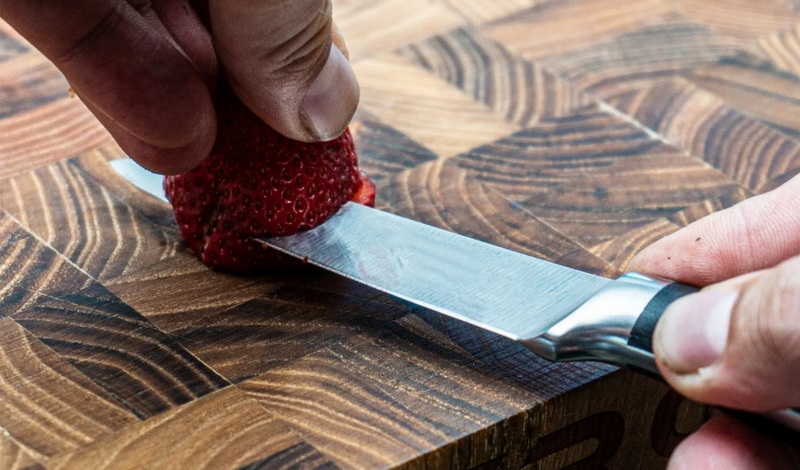

Views: 222 Author: Vivian Publish Time: 2024-11-26 Origin: Site








Content Menu
● Understanding Damascus Steel
>> 2. Drying
>> 1. Choosing a Sharpening Method
● Storing Damascus Kitchen Knives
● Preventing Rust on Damascus Knives
>> 3. Quick Wipe Down After Use
● Caring for High Carbon Steel Knives
>> 1. How often should I sharpen my Damascus kitchen knives?
>> 2. Can I put my Damascus knives in the dishwasher?
>> 3. What type of oil should I use on my Damascus knives?
>> 4. How do I know when my knife needs sharpening?
>> 5. Is it safe to store my Damascus knives in a drawer?
Damascus kitchen knives are renowned for their beauty, sharpness, and durability. Made from layered steel, these knives not only serve as functional tools in the kitchen but also as pieces of art. However, to maintain their performance and aesthetic appeal, proper care is essential. This article will delve into various aspects of caring for Damascus kitchen knives, including cleaning, sharpening, storage, and maintenance tips.

Before discussing care techniques, it's important to understand what Damascus steel is. Traditionally, Damascus steel refers to a type of steel used in sword making that originated in the Near East. The modern interpretation involves layering different types of steel to create a blade that is both strong and flexible. The unique patterns formed during the forging process give Damascus knives their distinctive appearance.
Caring for your Damascus kitchen knives is crucial for several reasons:
- Longevity: Proper maintenance can significantly extend the life of your knife.
- Performance: A well-cared-for knife performs better, providing cleaner cuts and reducing fatigue during use.
- Aesthetics: Regular cleaning and oiling help preserve the beautiful patterns on the blade.
Cleaning your Damascus knife after each use is one of the most important steps in maintaining its quality.
Always hand wash your Damascus knives instead of putting them in the dishwasher. The high heat and harsh detergents can damage the blade and handle. Use warm water and mild soap to gently clean the blade. Avoid using abrasive sponges or scouring pads that can scratch the surface.
After washing, dry the knife immediately with a soft cloth. Leaving water on the blade can lead to rust formation, especially if your knife has a high carbon content.
Be cautious when cutting acidic foods like tomatoes or citrus fruits. Acidic substances can cause discoloration on the blade over time. If you do cut such foods, make sure to clean the knife promptly afterward.
A sharp knife is a safe knife; dull blades require more force to cut through food, increasing the risk of accidents.
There are several methods for sharpening Damascus knives:
- Whetstone: This traditional method allows for precise control over the angle and pressure applied while sharpening.
- Honing Rod: A honing rod is useful for maintaining edge alignment between sharpenings but does not replace the need for a whetstone.
- Professional Sharpening Services: If you're unsure about sharpening your knife yourself, consider using a professional service.
When sharpening your knife, maintain an angle between 15 to 20 degrees. This angle helps achieve a fine edge without compromising the blade's integrity.
Regularly honing your knife can reduce the frequency of sharpening needed. A few swipes on a honing rod after each use can keep your blade aligned and sharp.

Proper storage is vital to protect your knives from damage and ensure safety in your kitchen.
Using a wooden knife block is an effective way to store your knives safely. Ensure that the block has slots specifically designed for different sizes of knives to prevent them from clashing against each other.
Magnetic strips mounted on walls are an excellent space-saving option that keeps your knives visible and easily accessible while protecting their edges from damage.
If you prefer drawer storage, consider using sheaths or blade guards to protect the blades from scratches and nicks while also preventing accidental cuts when reaching into drawers.
Rust is one of the most significant threats to Damascus steel due to its layered composition.
Applying a thin layer of food-safe mineral oil or camellia oil after cleaning helps create a protective barrier against moisture and prevents rust formation.
Store your knives in a dry environment with controlled humidity levels. Excessive moisture can lead to rusting, so avoid storing them in damp drawers or cabinets.
Make it a habit to wipe down your knife with a dry cloth after each use, especially if you've been cutting wet ingredients.
Many Damascus knives are made with high carbon steel, which requires specific care techniques:
- Frequent Cleaning: High carbon steel is more prone to rust than stainless steel; thus, frequent cleaning is essential.
- Immediate Drying: Always dry high carbon blades immediately after washing to prevent corrosion.
- Avoiding Soaking: Do not soak high carbon steel knives in water as this increases exposure to moisture.
Taking care of your Damascus kitchen knives involves regular cleaning, proper sharpening techniques, safe storage practices, and preventive measures against rust. By following these guidelines, you can ensure that your knives remain functional and beautiful for years to come.
Maintaining these exquisite tools not only enhances their longevity but also elevates your cooking experience by providing sharper and more reliable cutting performance.

It depends on usage; generally, you should sharpen them every few months or when you notice they are not cutting as effectively as before.
No, it is recommended to hand wash them with mild soap and warm water to prevent damage from heat and harsh detergents.
Use food-safe mineral oil or camellia oil to protect against rust while ensuring that it's safe for food contact.
If you find yourself applying more pressure while cutting or if the blade does not slice through food smoothly, it's time for sharpening.
Yes, but ensure they are protected with sheaths or guards to prevent scratches and accidental cuts when reaching into the drawer.